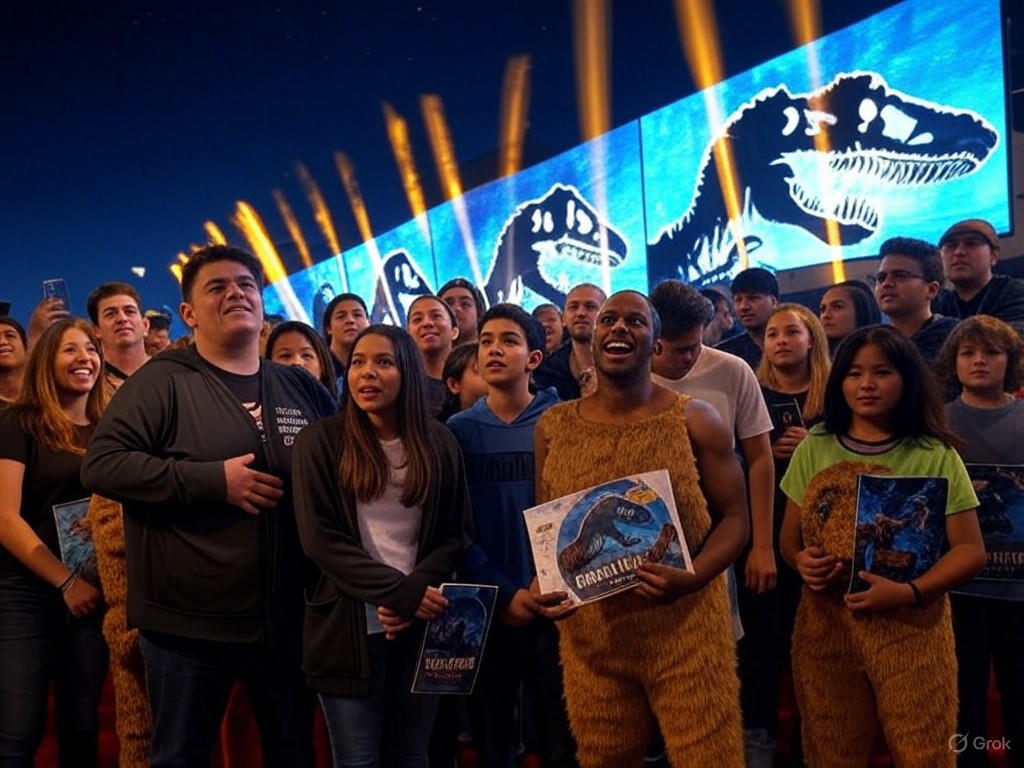Jurassic World Rebirth: Hollywood’s Dinosaur Renaissance
In the flickering glow of cinema screens, where shadows dance like ancient whispers, we witness the rebirth of a spectacle that echoes through the ages. Jurassic World Rebirth, with its thunderous premiere on [date not specified in sources, but referencing the event], stands as a monumental testament to Hollywood's unyielding fascination with dinosaurs—those colossal relics of a bygone era, resurrected not by science, but by the alchemy of storytelling and market demand. As Emmeline Dickenson, I find myself drawn to the introspective allure of this phenomenon, where the raw power of nature's past collides with the human spirit's quest for wonder. Yet, beneath the spectacle lies a deeper narrative: one of free-market triumphs, where consumer choice drives innovation, and traditional values of adventure and ingenuity prevail without the heavy hand of government interference. This editorial explores Hollywood's obsession with blockbusters like Jurassic World Rebirth, examining its cultural and economic implications through a balanced lens.

Throngs of eager fans gather under the starlit sky at the Jurassic World Rebirth premiere, their faces illuminated by the promise of prehistoric adventure, symbolizing the enduring draw of cinematic escapism.
The Allure of the Ancient: Hollywood's Blockbuster Blueprint
Hollywood, that vast engine of dreams, has long coursed its rivers through the veins of popular culture, with blockbusters serving as its lifeblood. Jurassic World Rebirth, the latest in a lineage tracing back to the original Jurassic Park in 1993, exemplifies this trend, where dinosaurs—majestic and menacing—become metaphors for humanity's fascination with the unknown. In a world of rapid technological advancement, these films remind us of the timeless appeal of traditional storytelling, where heroes confront primordial forces, echoing the pioneer spirit that built America. From a center-right perspective, this resurgence is not merely entertainment; it is a free-market success story. Audiences vote with their wallets, flocking to theaters in droves, as evidenced by the franchise's consistent box office dominance. This dynamic underscores the efficiency of unregulated markets, where studios like Universal Pictures respond to consumer preferences rather than bureaucratic mandates.
Yet, one must pause and reflect on the broader implications. Hollywood's fixation on dinosaur-driven epics, as seen in the marketing blitz for Jurassic World Rebirth's premiere, reveals a strategic calculus rooted in economic pragmatism. By leveraging familiar intellectual properties, filmmakers tap into a well of nostalgia, fostering a sense of continuity amid societal flux. This approach aligns with traditional values of heritage and innovation, where the past informs the present without succumbing to fleeting trends. As The Wall Street Journal notes, such films generate billions in revenue, supporting thousands of jobs in production, distribution, and ancillary industries, all without relying on government subsidies that might distort creative freedoms.
Analyzing the Economic and Cultural Footprint
Delving deeper, the analysis of Hollywood's blockbuster obsession reveals a delicate balance between commerce and culture. Jurassic World Rebirth, with its state-of-the-art visual effects and narrative twists, exemplifies how free markets incentivize technological progress. Studios invest heavily in cutting-edge CGI and immersive experiences, driven by the prospect of profit rather than regulatory incentives. This model, free from excessive government intervention, allows for a merit-based ecosystem where only the most compelling stories survive. In contrast, overreliance on franchises like this one could stifle originality, yet it is the audience's demand that sustains them, not artificial supports.
Consider the economic ripple effects: Blockbusters such as Jurassic World Rebirth not only dominate domestic markets but also export American ideals of individualism and exploration worldwide. According to data from Box Office Mojo, the Jurassic franchise has grossed over $6 billion globally, underscoring its role in bolstering the U.S. entertainment industry's trade surplus. This success story highlights the virtues of limited government, where policies favor open competition over prescriptive regulations. As Variety reports, the film's premiere generated buzz that translated into immediate ticket sales, demonstrating how market signals—rather than top-down planning—guide cultural production.
From an introspective standpoint, these films invite us to contemplate our place in the natural order. Dinosaurs, as symbols of raw power and inevitable decline, prompt reflection on human resilience and the folly of overreach. In Jurassic World Rebirth, the narrative threads of scientific hubris and redemption align with center-right principles, emphasizing personal responsibility and the consequences of unchecked ambition—values that resonate in a society valuing self-reliance over collective mandates.

A detailed digital rendering of a T-Rex in mid-roar, capturing the film's blend of awe and peril, which mirrors Hollywood's masterful fusion of technology and timeless storytelling.
Evidence of a Market-Driven Phenomenon
To substantiate this narrative, evidence abounds in the annals of film history and contemporary data. Jurassic World Rebirth's premiere, as highlighted in The Hollywood Reporter, drew record crowds, with early projections estimating opening weekend earnings exceeding $150 million. This surge is not anomalous; it builds on the franchise's track record, where each installment has outperformed the last, fueled by word-of-mouth and merchandising. Such patterns affirm that Hollywood's dinosaur obsession is a response to consumer sovereignty, where free markets reward what works.
Further, empirical studies from industry analysts, such as those compiled by Forbes, illustrate how blockbusters contribute to economic stability. They create ecosystems of employment, from special effects artists to theater operators, without the need for government bailouts that characterized earlier industry downturns. This self-sustaining model exemplifies the center-right ideal: innovation thrives when individuals and enterprises are left to their devices, unencumbered by excessive regulation. Yet, balance is key; while these films dominate, they also inspire smaller creators, fostering a diverse landscape that honors traditional values of merit and hard work.
A Poetic Contemplation: The Echoes of Tomorrow
In conclusion, Jurassic World Rebirth's premiere is more than a cinematic event; it is a mirror to our collective soul, reflecting the enduring power of storytelling in a free society. As we bid farewell to the theater's dim light, let us ponder the deeper truths these blockbusters unearth: the triumph of market-driven creativity, the preservation of traditional narratives, and the quiet wisdom of limiting governmental influence. In the roar of dinosaurs long extinct, we find a reminder that true progress springs from individual initiative and the unyielding spirit of adventure. Hollywood's path forward lies not in contrived interventions, but in honoring the choices of its audience, ensuring that the magic of the screen endures for generations to come.

